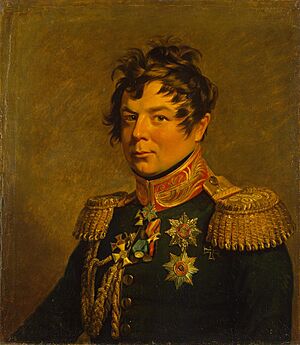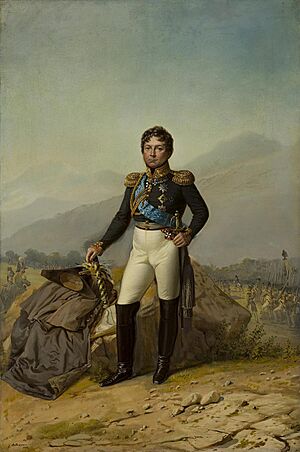Hans Karl von Diebitsch facts for kids
Quick facts for kids
Graf
Hans Karl von Diebitsch
Sabalkanski
|
|
|---|---|

Portrait by George Dawe, Military Gallery of the Winter Palace (1821–1825)
|
|
| Other name(s) | Ivan Ivanovich Dibich-Zabalkansky; Ivan Ivanovich Diebitsch |
| Born | 13 May 1785 Groß Leipe, Lower Silesia, Kingdom of Prussia |
| Died | 10 June 1831 (aged 46) Kleszewo, Kingdom of Poland |
| Allegiance | |
| Service/ |
Imperial Russian Army |
| Years of service | 1801–1831 |
| Rank | Field marshal |
| Battles/wars |
|
| Awards | Order of St. George Pour le Mérite Order of the Red Eagle Order of St. Vladimir Order of Saint Anna Order of Saint Alexander Nevsky Order of Leopold (Austria) Kulm Cross Gold Sword for Bravery Order of the White Eagle Military Order of Maria Theresa |
Hans Karl Friedrich Anton Graf von Diebitsch und Narten was a famous military leader. He was born in Germany in 1785. He later became a Field Marshal for the Russian Empire. He played a big part in many important wars during his time.
Contents
Early Military Life
Hans Karl went to a military school in Berlin. In 1801, he joined the Russian army. His father, who was an aide to Frederick II of Prussia, also served Russia.
Hans Karl fought against Napoleon in 1805. He was hurt at the Battle of Austerlitz. He also fought in the battles of Eylau and Friedland. After Friedland, he was promoted to captain.
Studying and Serving
For the next five years, he studied military science. He returned to active service in the War of 1812. He showed great skill in Wittgenstein's campaign. He was especially brave at the Second Battle of Polotsk. After this battle, he became a major-general.
Later in the campaign, he worked with General Yorck. They negotiated an important agreement called the Convention of Tauroggen. This agreement helped shape the start of the German Campaign of 1813.
Rise to Prominence
After the Battle of Lützen in 1813, he served in Silesia. He helped negotiate the secret Treaty of Reichenbach. He showed great courage at the battles of Dresden and Leipzig. For his actions, he was promoted to lieutenant-general.
During the final part of the 1814 campaign, he strongly pushed for the allies to march on Paris. After they entered the city, Emperor Alexander gave him the Order of Saint Alexander Nevsky. This was a very high honor.
Influence and Key Roles
In 1815, he attended the Congress of Vienna. This was a big meeting of European leaders. Afterwards, he became an adjutant-general to the emperor. He had a lot of influence with both Emperor Alexander and his successor, Nicholas.
Emperor Nicholas made him a baron, and later a count. In 1820, he became the chief of the general staff. In 1825, he helped stop the Decembrist revolt. This was a rebellion against the new emperor.
Major Victories
His most famous achievements were in the Russo-Turkish War of 1828–1829. After a tough start, Diebitsch led a brilliant campaign. He crossed the Balkans and captured Adrianople.
This victory earned him the rank of Field Marshal. He also received the special title of Zabalkansky. This means "Trans-Balkan" and honored his crossing of the mountains.
Final Campaign and Death
In 1830, he was put in charge of a large army. Their mission was to stop the November Uprising in Poland. He fought in the Battle of Grochow on February 25. This battle did not have a clear winner.
He later won the Battle of Ostrołęka on May 26. However, he soon became sick with cholera. Hans Karl von Diebitsch died on June 10, 1831, near Pułtusk.
 | Mary Eliza Mahoney |
 | Susie King Taylor |
 | Ida Gray |
 | Eliza Ann Grier |


